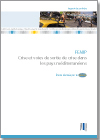 While the US and European banking systems were overwhelmed by the subprime crisis and credit crunch, Mediterranean member countries of the FEMIP (*) to a large extent withstood the crisis in 2009. How did they overcome this hurdle, and how can the road to growth be rediscovered? A study on this issue was published by Femise and the EIB on 29 November 2010 (download the report, 116 pages – 4 Mo)
While the US and European banking systems were overwhelmed by the subprime crisis and credit crunch, Mediterranean member countries of the FEMIP (*) to a large extent withstood the crisis in 2009. How did they overcome this hurdle, and how can the road to growth be rediscovered? A study on this issue was published by Femise and the EIB on 29 November 2010 (download the report, 116 pages – 4 Mo)
Countries in the south and east of the Mediterranean did not escape the world economic crisis, experiencing real and indirect impacts and not without feeling a financial impact.
“The contagion mechanism was different in countries in the South. It was not the financial crisis that affected them, but rather the recession in developed countries that led to a sharp reduction in external demand and international financial flows (remittances from expatriates, foreign trade, FDI). Tribute must be paid to the courage of these countries, which have been able to continue recording positive growth”, says the vice-president of the EIB , Philippe de Fontaine Vive, who has ordered a study of the crisis in the Mediterranean at the Euro-Mediterranean Forum of Institutes of Economic Sciences (FEMISE ).
After ten months of research, some ten international researchers and economists published a report entitled “Crises and methods of emerging from crises in FEMIP partner countries in the Mediterranean”.
Ten months enquiries
This 100-page document gives the reasons why these countries in the South weathered the crisis better. “No country in the Mediterranean had a fully-convertible capital account, which proved to be positive in the current crisis. This advantage during a crisis is a disadvantage in the medium-term, inasmuch as it deprives states and private investors of a source of finance”, notes Jean-Louis Reiffers, the president of the Femise scientific committee and coordinator of the latest report alongside Ahmed Galal of the Economic Research Forum, Egypt.
While exports of goods from countries in the Mediterranean fell 30% (70 billion dollars), imports fell just 18.6%, ($50 billion). Result: the trade deficit grew slightly to close $22 billion and tourism receipts fell 5%. “We saw a change in tourist behaviour, with a fall in daily expenditure but an increase in nights spent in the region”, says Jean-Louis Reiffers.
The crisis curbed foreign direct investment (FDI), weakening economies in the region. “We saw a fall in remittances from overseas workers and a 30% fall in FDI”, adds Mr. Reiffers.
Following an analysis of the Mediterranean economy, researchers insist on the need of Mediterranean countries to continue the opening-up of their economies to trade in goods and services and their structural policies, whatever the cost.
(*)FEMIP (the Facility for Euro-Mediterranean Investment and Partnership) was created in October 2002 at the request of the European Council in Barcelona to strengthen and broaden the work of the EIB to include partner countries in the Mediterranean.
Download the english version of the report (116 pages – 4 Mo)

